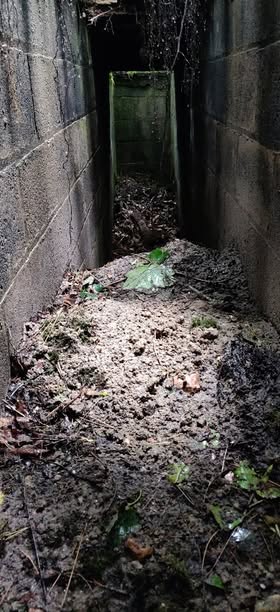Elsham is a village in North Lincolnshire and is situated 4 miles north from Brigg.
| Name | Occupation | Posted from | Until |
|---|---|---|---|
| Sergeant Horace Easton | Limestone quarryman |
Unknown | 03 Dec 1944 |
| Corporal Michael McShane | Kitchen gardener |
Unknown | 03 Dec 1944 |
| Private T. Moore | Unknown | 03 Dec 1944 | |
| Private Frederick Robinson | Farm worker |
Unknown | 03 Dec 1944 |
| Private Kenneth James Scott | Limestone burner |
Unknown | 03 Dec 1944 |
| Private Gordon Richard Wraith | Assistant gardener |
Unknown | 03 Dec 1944 |
Elsham Patrol’s OB is situated in private woodland at the bottom of a slope near Deepdale Plantation, not far from the B1206 road. This is one of 15 Lincolnshire OBs that were built by John Sheffield of Scunthorpe with Royal Engineers labouring. It was constructed from prefabricated concrete panels that were bolted together. Breezeblocks were used for building end walls and walls of emergency exit passage.
The OB was accessed with a ladder down a drop-down shaft built from breezeblocks. [2.40m drop down shaft, opening 0.70cm x 0.80cm].
A doorway in the far corner of the main chamber [3.50m L x 2.30m W x 2.10m H] gives access to a passage [3.4m long] that turns off at right angles. The passage has a roof made from curved corrugated sheeting and the breezeblock wall here appears to have been covered with pitch. Three steps lead upwards and out, at right angles, through another doorway, into what we believe used to be the ammunition store.
The date “1941” was written in concrete by the builders of the structure and it can clearly be seen on the end wall, just below the roofline, beside the exit doorway
The 6m long exit passage has breezeblock walls and a roof constructed from flat corrugated sheeting. It is high enough for walking through upright. Although the walls are in very good condition, the corrugated sheeting forming the roof is badly corroded and there are currently several large gaps in the roof.
The ammunition store [3.50m L x 3.60m W] is aligned in the same direction as the main chamber but its floor level was higher. It had a curved corrugated iron roof that has collapsed, and currently presents itself as a deep depression in the ground, with remains of much corroded corrugated sheeting, some still adhering to the earthen walls. A doorway at its other end leads into the emergency escape passage that turns off to the right at right angles.
A toilet cubicle has been incorporated into the emergency exit passage, in a dead end to the left of the doorway. It contains two vents.
At the end of the passage there is a rectangular-shaped emergency exit opening [0.80cm x 0.90cm], approximately 2.20m above the passage floor. The absence of rungs indicates that a ladder would have been used for getting out. The opening would originally have been covered by a steel lid with a tray containing soil and vegetation for camouflage on top of it. The cover would have been locked in position by a key of the type that is commonly used for manholes. Turning the key would have lowered the cover which could then be pushed aside and into an adjoining steel case that is still in situ.
The entrance shaft, main chamber and the connecting passage to the ammunition store all are well ventilated and in excellent condition. [2011]
The OB is shown in the second half of this film.
Elsham Patrol
Local targets would have included RAF Kirmington along with railway line and railway bridges in the vicinity.
Training was carried out locally within the area the Patrol operated or at the regional headquarters at Wellingore, Blankney or Dalby. All Patrols also went to Coleshill House for specialist training.
TNA ref WO199/3389
Hancock data held at B.R.A
Evelyn Simak and Adrian Pye 2011
Dave Hunter 2022 and Nicks Exploration and Angus Townley
Mark Sansom, The Secret Army, Heritage Lincolnshire (2004)
John Andrew, and the late Tom Andrew Barton upon Humber (personal interview)
Dennis Holloway




























